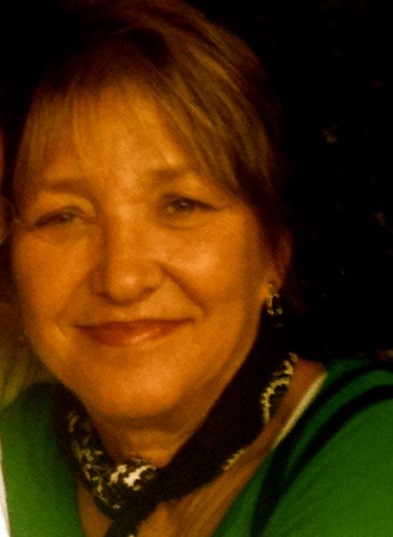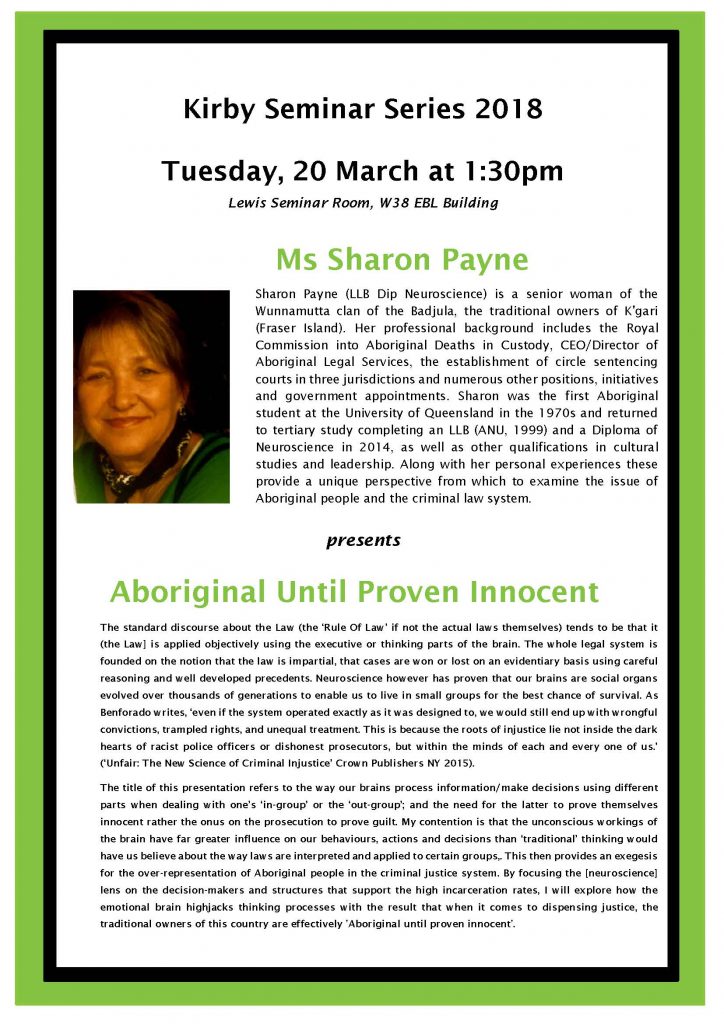Kirby Seminar Series 2018
Tuesday, 20 March at 1:30pm
Lewis Seminar Room, W38 EBL Building
Sharon Payne (LLB Dip Neuroscience) is a senior woman of the Wunnamutta clan of the Badjula, the traditional owners of K’gari (Fraser Island). Her professional background includes the Royal Commission into Aboriginal Deaths in Custody, CEO/Director of Aboriginal Legal Services, the establishment of circle sentencing courts in three jurisdictions and numerous other positions, initiatives and government appointments. Sharon was the first Aboriginal student at the University of Queensland in the 1970s and returned to tertiary study completing an LLB (ANU, 1999) and a Diploma of Neuroscience in 2014, as well as other qualifications in cultural studies and leadership. Along with her personal experiences these provide a unique perspective from which to examine the issue of Aboriginal people and the criminal law system.
presents
Aboriginal Until Proven Innocent
The standard discourse about the Law (the ‘Rule Of Law’ if not the actual laws themselves) tends to be that it (the Law] is applied objectively using the executive or thinking parts of the brain. The whole legal system is founded on the notion that the law is impartial, that cases are won or lost on an evidentiary basis using careful reasoning and well developed precedents. Neuroscience however has proven that our brains are social organs evolved over thousands of generations to enable us to live in small groups for the best chance of survival. As Benforado writes, ‘even if the system operated exactly as it was designed to, we would still end up with wrongful convictions, trampled rights, and unequal treatment. This is because the roots of injustice lie not inside the dark hearts of racist police officers or dishonest prosecutors, but within the minds of each and every one of us.’ (‘Unfair: The New Science of Criminal Injustice’ Crown Publishers NY 2015).
The title of this presentation refers to the way our brains process information/make decisions using different parts when dealing with one’s ‘in-group’ or the ‘out-group’; and the need for the latter to prove themselves innocent rather the onus on the prosecution to prove guilt. My contention is that the unconscious workings of the brain have far greater influence on our behaviours, actions and decisions than ‘traditional’ thinking would have us believe about the way laws are interpreted and applied to certain groups,. This then provides an exegesis for the over-representation of Aboriginal people in the criminal justice system. By focusing the [neuroscience] lens on the decision-makers and structures that support the high incarceration rates, I will explore how the emotional brain highjacks thinking processes with the result that when it comes to dispensing justice, the traditional owners of this country are effectively ‘Aboriginal until proven innocent’.
Lunch will be provided in the Law Staff tea room from 12.30 – for catering purposes, please rsvp to Lyn Gollan by Friday 16 March.





Good morning Sharon
I saw your episode on one plus one last night.
I totally think we should work together to help human brains!!!!!!
You can find me on LinkedIn
Maxine Blanchard- Reflexologist and Oncology Massage – Grafton Australia.
I really look forward to putting our heads together.
Regards
Maxine Blanchard